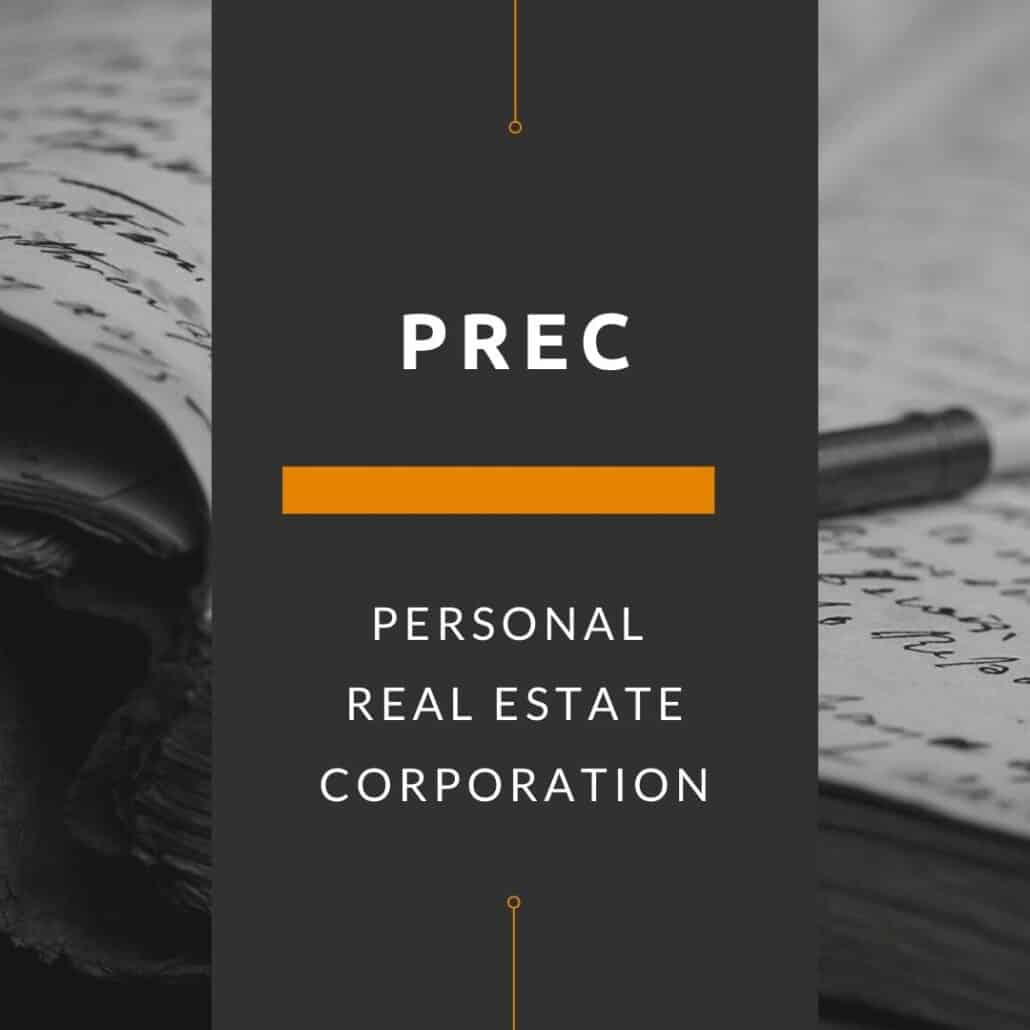A Personal Real Estate Corporation, Ontario, also known as PREC Ontario, is incorporated under the Ontario Business Corporation Act. PREC Ontario has only one controlling shareholder, such as a broker or a Realtor owning all equity shares with voting rights. The Controlling shareholder should be the president and sole director and officer of the Corporation.
Real Estate Council of Ontario ( RECO ) has set specific guidelines and checklist criteria to ensure that all PREC incorporated comply with the Personal Real Estate Corporation Ontario regulations.
At Shaikh Law, our corporate lawyers will help you incorporate a Personal Real Estate Corporation following the guidelines, checklist, regulations, and RECO restrictions.

In the dynamic landscape of Ontario’s real estate market, professionals are always seeking innovative ways to bolster their businesses and optimize their financial management. Personal Real Estate Corporations (PREC) offer a potent avenue for real estate agents to achieve these goals. The power of PREC lies in its ability to confer tax advantages, pave the way for income splitting, and open doors to superior estate planning.
There are several advantages associated with operating under a PREC. Here are a few key benefits:
1. Tax Planning Opportunities: Operating as a PREC can provide significant tax advantages. While individual income is subject to personal tax rates, which can be quite high, a corporation pays corporate tax rates, which are typically lower. This tax difference can result in substantial savings.
Currently, an active business corporation in Ontario pays a combined corporate tax rate of 12.5% on its first $500,000 of income and 26.5% on any income exceeding that. On the other hand, the topmost personal tax rate for individuals in Ontario stands at 53.53%. Incorporation should generally be considered by real estate professionals when their earnings exceed the amount needed for personal living expenses and RRSP contributions, if applicable. If their entire income is necessary for annual expenses, incorporation may not be the right fit. Tax deferral can be beneficial when income varies from year to year.
2. Income Splitting:
Through a PREC, real estate professionals can implement income-splitting strategies with family members in lower tax brackets to minimize their overall tax burden. This is typically achieved by issuing non-voting shares to family members and paying them dividends.
3. Business Expense Deductions:
A corporation can deduct legitimate business expenses from its income, which can reduce the corporation’s overall tax liability.
4. Limited Liability:
In a typical corporation, liability is generally confined to the corporation’s assets and does not extend to the shareholders’ assets. However, for a personal real estate corporation, the controlling shareholder registered as a broker or salesperson will still bear personal liability for the services provided to consumers in Ontario and will be answerable to RECO for breaches of the Trust in Real Estate Services Act and misconduct.
5. Estate Planning:
A PREC can be an effective tool for succession and estate planning. It can help in the transfer of wealth to the next generation and can be used to provide a seamless transition of the business in the event of the real estate professional’s retirement or death.
In conclusion, a PREC is not just a corporate structure; it’s a strategic tool for Ontario’s real estate professionals to enhance their financial health and plan for their business’s future. However, while a PREC offers many benefits, it also comes with its own set of responsibilities and obligations. It is, therefore, crucial to seek professional advice before deciding to form a PREC.
Establishing a Personal Real Estate Corporation (PREC) in Ontario involves a series of steps that require careful attention to ensure compliance with regulations set by the Real Estate Council of Ontario (RECO). If you’re contemplating setting up a PREC, follow these detailed steps:
1. Consult with Professionals
Before proceeding with the incorporation process, consulting with financial advisors, tax professionals, and PREC lawyers is crucial. They will provide you with advice tailored to your specific situation and help you understand the benefits, obligations, and potential drawbacks of setting up a PREC.
2. Confirm with Your Brokerage
Before you start the process, you need to ensure that your brokerage will permit the use of a PREC. It’s a good idea to have this conversation early on to avoid any surprises or delays later in the process.
3. Comply with Legislative Criteria and Conditions
You need to ensure that the corporation you’re establishing meets all the criteria and conditions as outlined in the legislation. These criteria include regulations about the nature of the corporation, its shareholders, directors, and officers, among others. The criteria are extensive, so it’s advisable to refer to the legislative checklist or consult with a legal expert to ensure full compliance.
4. Create an Agreement
You must formulate an agreement between yourself (the registrant), the PREC, and the brokerage. In most cases, your brokerage may already have one. This agreement must contain the required content as set out in the legislation. It’s best to refer to the checklist provided in the legislative guidelines or seek the assistance of a legal professional to ensure that all necessary content is included.
5. Incorporate the PREC
Once the above steps are completed, you can then proceed to incorporate your PREC. The corporation should be incorporated under the Ontario Business Corporations Act. You’ll likely need the assistance of a PREC lawyer to ensure this process is done correctly.
6. Provide the Required Information to RECO
After the corporation is established, you need to provide the legal name of the PREC and its address for service to RECO. The information should be emailed to PREC@reco.on.ca.
Remember, setting up a PREC involves a fair amount of legal and financial planning. Therefore, it is always advisable to engage the services of professionals in these areas to ensure all steps are completed accurately and comply with all necessary regulations.

Our Lawyers will draft articles of incorporation as per RECO guidelines.
Our Lawyers will Incorporate Personal Real Estate Corporation in Ontario.
Electronic Minute Book in accordance with RECO guidelines

Incorporating a Personal Real Estate Corporation (PREC): Costs and Legal Fees
If you’re planning to incorporate a Personal Real Estate Corporation (PREC), it’s essential to understand the costs involved. At Shaikh Law, we provide a transparent fee structure to assist you in this process.
Legal Fees
Our legal fees for incorporating a PREC stand at $450 + HST. This cost includes providing expert guidance throughout the incorporation process and ensuring that all necessary legal documentation is in order.
Government Fees
The Ontario government charges a fee of $300 for incorporating a PREC. This is a standard charge levied on all corporations during the incorporation process.
Third-Party Service Provider Charges
There is also a charge of $89.89 for filing the articles of incorporation online, which is undertaken by a third-party service provider like OnCorp Direct Inc. This charge is levied by the service provider and is independent of our legal fees.
Drafting Articles of Incorporation
If you require our legal services to draft the articles of incorporation according to RECO guidelines, we charge $450 + Tax. This involves ensuring that your articles of incorporation are compliant with all relevant guidelines and regulations.
Electronic Minute Book
Should you wish to procure an electronic minute book as part of your PREC incorporation, we offer a complete package at $720. This package includes drafting and preparing all necessary documentation in line with RECO guidelines, incorporating your PREC, and providing an electronic minute book for your records.
In summary, incorporating a PREC involves several costs, including legal fees, government charges, and third-party service provider fees. We strive to provide clear and comprehensive services to assist you in navigating this process seamlessly.

(905) 795 7757
info@slclawyer.ca
(905) 795 7757
Our clients can retain our legal services online by completing the get started online form. Once we have received your request to retain our services, documents and payment we will confirm in writing if we will be representing you in the matter. It is that simple.
Client Intake information
Multiple Meeting Locations
Ajax | Aurora | Peterborough | Barrie |Barrhaven | Bowmanville | Brampton | Brantford | Burlington | Cambridge | Chatham | Clarington | Cooksville | Durham Region | Kanata | Etobicoke | GTA | Guelph | Halton Region | Hamilton | Kawartha | Kingston | Kitchener | London | Markham | Milton | Mississauga | Muskoka |Nepean | Newmarket | Niagara | North York | Oakville | Ottawa | Orleans | Peel Region | Pickering | Richmond Hill | Sault Ste Marie | Scarborough | Saint Catherines | Stouffville | Sudbury | Thornhill | Thunder Bay | Toronto | Unionville | Uxbridge | Vaughan | Waterloo | Whitby | Windsor | York | Ontario | Canada

